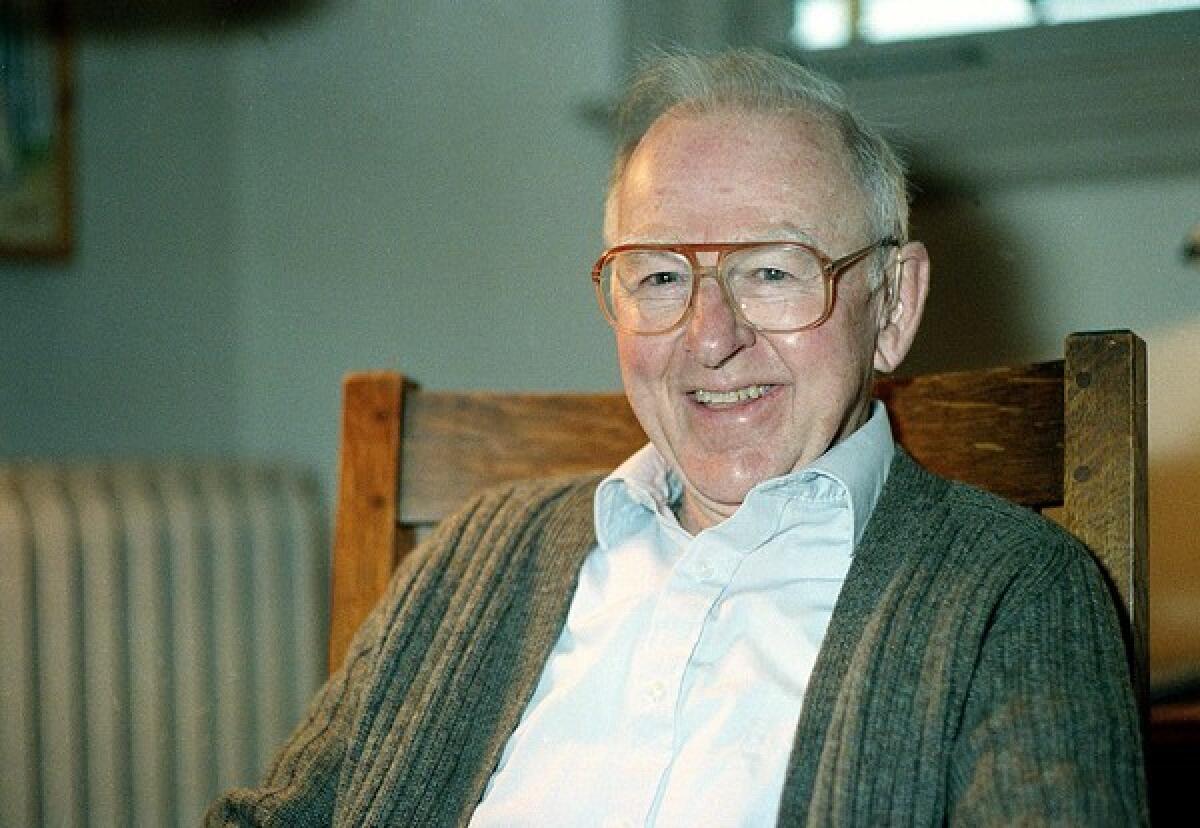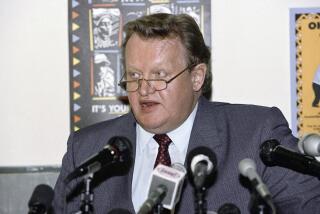Dr. Edwin G. Krebs dies at 91; Nobel laureate co-discovered fundamental cell processes

Dr. Edwin G. Krebs, the University of Washington Nobel laureate who co-discovered the mechanism by which a wide variety of processes are turned on and off within cells and thereby led to an explosion of knowledge about how cells grow, change, divide and die, died Dec. 21 in Seattle from progressive heart failure. He was 91.
Krebs and his co-laureate Edmond H. Fischer discovered that most processes within cells -- ranging from fundamental metabolic reactions to the initiation of cancer -- are triggered when key proteins are activated by a process called phosphorylation, in which a phosphate molecule is added to the protein.
By adding or removing the phosphate, the enzyme’s activity can be switched on or off. Krebs and Fischer were the first to identify and characterize an enzyme that carries out this reaction, which is the basis of all biological function.
The process is so important that 1% of the human genome is devoted to blueprints for the production of the enzymes that carry out phosphorylation, according to the Nobel Prize citation.
Their work has helped researchers understand such disparate biological problems as how the drug cyclosporine prevents rejection of transplanted organs, why certain cancers develop, how hormones affect the body, how genetic information is transcribed into proteins and how the body metabolizes sugar to produce energy.
Defects in regulation of phosphorylation are at the heart of many disorders such as cancer, diabetes, nerve diseases and heart conditions, and a wide variety of modern drug research is targeted at the manipulation of this process.
The pair’s collaboration began in 1955 shortly after Fischer arrived at the University of Washington from his native Switzerland and learned that he and Krebs were investigating the same problem -- how muscles obtain the energy to contract.
“Krebs slapped me on the back and said, ‘Let’s take a crack at that problem,’ ” Fischer recalled in 1992 when they received the Nobel Prize for physiology or medicine. Initially, they worked so closely together that, if one had to leave to deliver a lecture, the other could run the experiment of the day.
While searching for that energy source, Fischer added, they “happened to stumble on a reaction that regulates the activity of a muscle enzyme. We had no idea how widespread this reaction would be . . . whether it would be something very unique or very unimportant.”
Other scientists also had no idea, and it took a decade before they began to see the reaction’s significance. Then, “it took off like a rocket,” Nobel committee member Hans Wigzell said at the time. “Now 10% of all biology articles in journals like Nature or Science deal with their field.”
Edwin Gerhard Krebs was born June 6, 1918, in Lansing, Iowa, the son of a Presbyterian minister and a schoolteacher. In his Nobel autobiography, he noted that he had no strong interest in science as a child beyond making gunpowder from materials gleaned from the drugstore and his older brother’s chemistry set.
He followed his brothers to the University of Illinois and enrolled in an “individual curriculum” program that allowed him to take a broad variety of math and science courses. In the wake of the Depression, he decided that chemistry or medicine would allow him to make a decent living. The choice between the two was made for him when he received a scholarship to Washington University School of Medicine in St. Louis.
He received his medical degree in 1943 and performed 18 months of residency before serving as a naval medical officer. That was the last time he practiced medicine.
Discharged in 1946, he returned to St. Louis looking for a residency, but was disappointed to find that all the positions had been filled by doctors who had been released earlier from military service. So he took a postdoctoral post in the biochemistry laboratory of Carl and Gerty Cori, who received a Nobel in 1947.
Entranced by the work, two years later Krebs took a faculty position at the University of Washington, where he spent all of his career except for an eight-year period from 1968 to 1977, when he was founding chairman of the department of biological chemistry at the UC Davis School of Medicine.
He also obtained a license to practice medicine in Washington, but he never had to adopt that fallback position.
At both institutions, he reveled in his administrative duties, noting that what he liked best about the job was the responsibility of selecting good faculty members.
Later in his career, he continued to study phosphorylation and branched out into carbohydrate metabolism and cell signaling. Even after his formal retirement in 1991, he continued his daily walk from home to the campus to perform research and meet with graduate students and postdoctoral fellows.
Krebs is survived by his wife of 64 years, Virginia “Deedy” Krebs, whom he met while she was a nurse at Washington University and he was a physician; daughters Sally Herman of Salem, Ore., and Martha Abrego of Shoreline, Wash.; son Robert of Seattle; four grandchildren; and six great-grandchildren.
More to Read
Start your day right
Sign up for Essential California for news, features and recommendations from the L.A. Times and beyond in your inbox six days a week.
You may occasionally receive promotional content from the Los Angeles Times.






